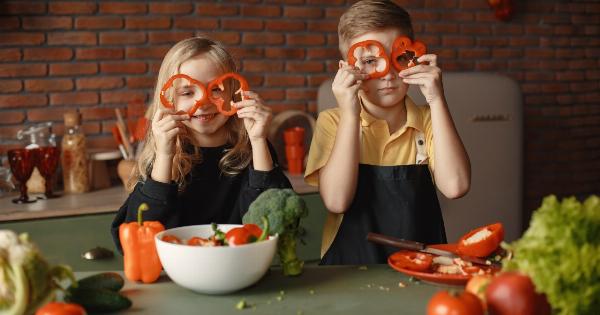Vegetarianism is a way of life that is gaining popularity all over the world. It is an ethical and health-conscious approach towards food that involves abstaining from consuming meat, fish, and poultry.
It has numerous benefits for adults, such as reducing the risk of heart disease, diabetes, and stroke. However, many parents wonder if it is safe to raise their children as vegetarians. In this article, we will explore the risks and benefits of raising a child as a vegetarian.
The Benefits of Raising a Child as a Vegetarian
There are several benefits to raising a child as a vegetarian:.
1. Improved Health
Studies show that individuals who consume a plant-based diet have a lower risk of developing chronic diseases such as heart disease, diabetes, and cancer.
By feeding your child a vegetarian diet, you are promoting a healthy lifestyle from a young age, which can help prevent the onset of these diseases later in life.
2. Lower Risk of Obesity
Vegetarian diets are typically lower in calories and fat than diets that include meat.
Children who are raised on a vegetarian diet are less likely to be overweight or obese, which can reduce their risk of developing weight-related health problems later in life.
3. Better Digestive Health
Vegetarian diets are rich in fiber, which promotes healthy digestion and prevents constipation. Children who eat a plant-based diet are less likely to have digestive issues such as bloating, gas, and abdominal discomfort.
4. Instills Good Eating Habits
Raising a child as a vegetarian can teach them to choose healthy, wholesome foods over processed junk food.
Children who are raised on a plant-based diet are more likely to develop a taste for fruits, vegetables, legumes, and whole grains, which can lead to a lifetime of healthy eating habits.
5. Environmental Benefits
The meat industry is a major contributor to greenhouse gas emissions, deforestation, and water pollution. By raising your child on a plant-based diet, you are teaching them to be environmentally conscious and to make choices that benefit the planet.
The Risks of Raising a Child as a Vegetarian
While there are numerous benefits to raising a child as a vegetarian, there are also some risks that parents should be aware of:.
1. Protein Deficiency
Protein is an essential nutrient that plays a key role in muscle growth and development.
Children who follow a strictly vegetarian diet may be at risk of not getting enough protein, as many vegetarian sources of protein are incomplete or less bioavailable than animal-based sources.
2. Iron Deficiency
Iron is essential for the production of hemoglobin, which carries oxygen in the blood. Iron deficiency is one of the most common nutrient deficiencies in children and can lead to anemia, fatigue, and decreased immunity.
Vegetarian sources of iron are less bioavailable than animal-based sources, which can make it more difficult for children to meet their iron needs.
3. Vitamin B12 Deficiency
Vitamin B12 is essential for the development of the nervous system and the production of red blood cells. It is only found in animal products, so children who follow a strictly vegetarian diet may be at risk of deficiency.
Vitamin B12 deficiency can lead to fatigue, poor memory, and nerve damage.
4. Calcium Deficiency
Calcium is essential for strong bones and teeth. Children who follow a vegetarian diet may be at risk of not getting enough calcium, as many vegetarian sources of calcium are less bioavailable than dairy products.
5. Micronutrient Deficiencies
Vegetarians may be at risk of not getting enough micronutrients such as zinc, iodine, and vitamin D, which are essential for growth and development. It can be challenging to get enough of these nutrients from a plant-based diet alone.
Conclusion
While there are risks associated with raising a child as a vegetarian, the benefits can outweigh them if the diet is carefully planned and balanced.
Parents who choose to raise their children on a vegetarian diet should work with a registered dietitian to ensure that their child is getting all of the essential nutrients they need to thrive.































